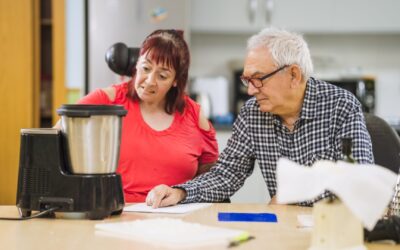Introduction
Navigating the National Disability Insurance Scheme (NDIS) can be a complex task, especially for parents seeking the right NDIS approach for children. At Re.Connect Support Services, we understand that accessing the right therapy and support for your child is crucial to their growth, development, and well-being. As an NDIS Registered Support Service Provider in Australia, we offer guidance and support for families looking to maximise their child’s NDIS plan.
In this guide, we’ll explore the range of therapy options available through NDIS supports. And how early intervention can make a significant impact on a child’s development.

1. What is the NDIS Supports for Children?
The National Disability Insurance Scheme (NDIS) is Australia’s support system for individuals living with a disability, providing tailored plans to help participants access services like therapy and allied health care.
For children, for example, the NDIS opens doors to early intervention and crucial therapies that aim to improve their development, independence, and participation in everyday activities.
2. Understanding NDIS Assistance for Children
NDIS supports are designed to cater to the unique needs of very young children and participants. These supports aim to enhance the child’s skills, enabling them to engage more fully in school, the community, and everyday life.
Families can access a range of therapies, including speech therapy, occupational therapy, and psychological services, to assist their child’s overall development.
3. The Role of Early Intervention in a Child’s Development

Early intervention is one of the most powerful early childhood approach for supporting children with developmental concerns or disabilities. By accessing NDIS early childhood partner intervention, families can provide timely support to help their child develop key skills during the critical early years.
These three early childhood intervention and supports can positively impact a child’s life during critical early years. This early childhood intervention includes assistance with communication, social interaction, and motor skills, which can lead to better long-term outcomes.
4. The Early Childhood Approach: What You Need to Know
Through the NDIS Early Childhood Approach, children aged 0-6 can receive tailored interventions that target their specific developmental needs. This early childhood approach is designed to support children with a developmental delay or disability, ensuring they have the best possible start in life. Assessing the current impact of a child’s disability is crucial when developing a support plan.
An early childhood partner can help guide parents through the process of understanding their child’s needs and developing a support plan.
5. How to Access NDIS Supports for Children
Accessing NDIS early childhood approach for your child involves submitting an access request form to the National Disability Insurance Agency (NDIA). It’s important to provide evidence of your child’s disability or developmental concerns, which may include reports from allied health professionals.
Considering this, If your child is found to be eligible for the ndis plan as is, the next steps will involve creating a tailored NDIS plan with services suited to your child build their unique needs.
Learn more about the NDIS access process on the NDIS website.
6. NDIS Early Childhood Partner: Supporting Families Every Step of the Way
When navigating the NDIS, an early childhood partner who provides early childhood approach can be an invaluable resource for families.
These professionals work with the NDIS to provide expertise gather information and support to help families understand and access the right services for their child. They also help in connecting parents young children with local community services and therapy providers.
7. Key Therapy Options Available Through NDIS Supports For Children
NDIS assistance for children provide access to a wide range of therapy options, each tailored to the child’s needs. Common therapies available through the NDIS include:
Speech Therapy:
- Enhances communication skills for children with language or speech delays.
Occupational Therapy:
- Focuses on helping children develop everyday skills like dressing, eating, and playing.
Physiotherapy:
- Aims to improve physical abilities, such as balance, coordination, and movement
8. Understanding Developmental Delay and Early Childhood Partner Intervention

A developmental delay occurs when a child does not reach typical developmental milestones as expected. With NDIS early childhood and family partner intervention, children younger than age six years old can access therapeutic supports to address these delays, helping them build the necessary skills for school and daily life.
9. Creating an NDIS Supports For Chilldren To Plan for Your Child’s Needs
Every child’s needs are different, which is why creating a personalised child’s NDIS plan is so important. This plan outlines the types of support and funding allocated to help your child who’s therapy and development.
It may include a mix of therapies, equipment, and other supports, depending on the amount help your child’s specific needs.
10. How Allied Health Professionals Support Your Child’s Development

Allied health professionals play a crucial role in delivering NDIS supports. These specialists work with families to assess the child’s needs and implement therapies that target their individual goals. Common allied health professionals involved in NDIS include speech pathologists, occupational therapists, and psychologists.
11. The Importance of Ongoing Reviews in the National Disability Insurance Agency Process
An important part of managing your child’s NDIS plan is scheduling regular reviews. These internal reviews ensure that the support and education your child receives remains relevant as they grow and develop new skills. Families can at internal review and request changes to the plan if additional services or modifications are needed.
12. Providing Evidence for NDIS Access: What You Need to Know
To ensure your child receives the appropriate level of support, it’s crucial to provide evidence from healthcare or allied health professionals when applying for disability benefit under the NDIS. This evidence must detail the child’s disability or developmental concerns and outline the recommended interventions.
13. Understanding NDIS Supports For Children in Funding for Therapy Services
The NDIS funding model allows families to access a range of therapy services without financial barriers. Whether your child requires speech therapy, occupational therapy, or psychological support, NDIS funding ensures that families have all the information and resources they need to provide the best possible care.
14. Mainstream Services and How They Complement NDIS Support

In addition to NDIS-funded therapy, families can also access mainstream services such as healthcare, education, and community programs. These mainstream services work alongside NDIS supports for school and family, to ensure children with disabilities or developmental delays receive comprehensive, holistic care.
15. How Re.Connect Supports Families Through the NDIS Journey
At Re.Connect Support Services, we are committed to helping families navigate the NDIS supports for children to system and access the supports their child needs. Our team of professionals works closely with parents to create tailored support plans and connect each child on them with the right services, ensuring that every child has the opportunity to reach their full potential.
Conclusion: The Path to Better Outcomes for Your Child’s NDIS Support For Children
Accessing NDIS supports for children can be life-changing for families navigating the challenges of childhood disabilities or developmental delays. By providing timely, appropriate interventions and working with allied health professionals, the NDIS helps children build crucial skills and participate more fully in everyday life.
At Re.Connect, we’re here to guide you help your child through every step of the NDIS journey, ensuring the best possible outcomes for your child and other families.
FAQs For NDIS Supports For Children
What is the early childhood approach under NDIS supports for children?
The early childhood approach supports children under age six with developmental concerns by providing early diagnosis and intervention services tailored to their needs.
How do I know if my child is eligible for NDIS supports for children?
To check your child or family’s life- younger eligibility, you need to submit an access request form along with medical evidence supporting your child’s diagnosis or developmental delay.
What therapies are funded by NDIS for children as a form of early childhood approach?
Common therapies funded include speech therapy, occupational therapy, and physiotherapy, all designed to enhance and manage a child’s development.
Can NDIS supports for children funding cover equipment for my child?
Yes, NDIS funding can cover assistive technology and other necessary equipment as a child’s support daily living and development. NDIS is a good early childhood partner. A good child’s support
How often should my child’s NDIS supports for children plan be reviewed?
Plans are typically reviewed annually, but families can request an earlier review if their child’s needs change significantly.


